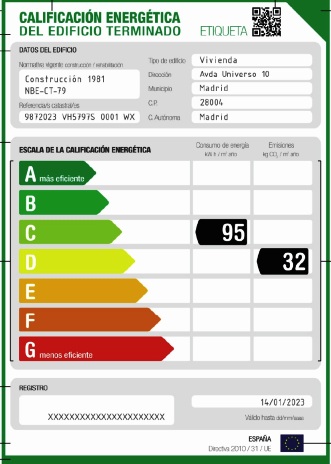Spanish Energy Efficiency Certificate
FAQ – Spanish Energy Efficiency Certificate for Existing Buildings
by Mark Stücklin
Spain has introduced a new law (Real Decreto 235/2013) obliging property owners to get energy efficiency certificates before they can sell or rent their homes, in line with other European countries. This FAQ provides basic information on the energy efficiency certificate.
What is the purpose of the new Energy Efficiency Certificates?
The Energy Efficiency Certificate provides objective information to buyers and tenants on the energy characteristics of existing buildings. This allows the potential buyers or lessors to assess and compare the energy characteristics of different buildings in their decision prior to procurement or signing of a lease.
Do I need to register the Energy Efficiency Certificate?
The certificate must be registered by the building owner with the Autonomous Administration in Spain, who may keep a record of these certifications in its territory. It is anticipated they will take into account the energy efficiency rating of the existing buildings in its jurisdiction to regulate a greater, or lower, tax burden based on the energy rating of the individual properties.

What types of residential properties require the Energy Certificate?
- All new buildings
- Buildings ( or individual apartments and premises) which are sold or rented to new tenants or owners.
Residential buildings that are exempt from requiring a Certificate are:
- Buildings (or individual units within a building) with a total useful floor area less than 50 m2.
- Buildings (or residential units within buildings) used for either less than four months a year or for a limited time a year with expected energy consumption of less than 25% of yearly consumption with a declaration submitted by the property owner of unit being used for short term rental.
Under what circumstances is the certificate mandatory?
A certificate is mandatory for all owners of a building (e.g. single-family dwelling or apartment building) or part of an existing building (e.g. apartment or premises) and is required prior to advertising the unit for sale or rent. Prior to entering the transaction, the certificate must be included in the information that the seller or landlord provides to the purchaser or tenant.
Who is responsible for residential energy efficiency certificates?
The Owner of the building, (or Owner of individual apartment unit) acting as Seller or Landlord, is responsible for commissioning the completion of the energy efficiency certificate. The energy label must be shown as part of the advertising for the properties sales or lease, and:
- For a sale, the seller must provide the buyer (at the notary) with an original copy of the certificate
- For a rental or lease, a photocopy of the current certificate must accompany the leasing documentation
Once the original certificate is obtained, the Certificate and its corresponding energy efficiency label are valid for 10 years. During this time, the property owner must maintain the relevant documentation; after the 10 year period, it is the responsibility of the property owner to revalidate the Certificate and associated label.
What if I sell or rent my property without advertising the energy efficiency label?
If the certificate and label are not obtained before the sale or lease, or the responsibility of obtaining the certificate is placed on the interested tenants or buyers as part of the sale or lease condition, the original property owner may suffer the following consequences:
- Sanctions and fines applied by the Autonomous Administration for violating Consumer Rights obligations.
- The Contract of Sale or the lease can be deemed invalid for failing to disclose required information to the Consumer as part of sale or lease.
- The existing seller or landlord will be required to compensate the buyer or tenant for any damages caused by the lack of information for not fulfilling their duty to inform the Consumer prior to the time of signing.
The Autonomous Administration will carry out periodical checks to ensure the property owner is in compliance with the new Decree and detect any cases of misrepresentation or fraud.
What are the steps required to get an energy efficiency certificate?
- Basic administrative information regarding the owner, property location and other general data about the building.
- An on-site energy audit will be conducted to obtain the required information to be used to generate the energy efficiency certificate. During the audit, the technician will collect information related to your buildings physical characteristics such as orientation, exterior exposure, window and door openings, along with a review of the building’s systems to identify mechanical, water, and electrical loads.
- After the on-site audit, the technician will use a computer software program authorized by the Ministry of Industry to run its energy efficiency calculations. The software will generate a report which will present and assess various recommendations for improvements along with determined existing energy efficiency letter grade (between A to G).
- Once complete, the Certificate is required to be validated by the local Autonomous Administration and an original copy will be delivered to the property owner, which is to be kept on file for 10 years or until re-validated.
What information is provided on the energy efficiency certificate?
- Identification of the building, or of the individual building units being certified.
- Description of tests, checks, and inspections, being carried out by the technician while providing the certification.
- Description of the energy characteristics of the building, thermal envelope, facilities, normal operating conditions and occupation, thermal comfort, lighting, indoor air quality, and other data used to derive the energy efficiency rating of the building.
- The energy efficiency rating of the existing building expressed by the energy label graded from A (most energy efficient) to G (lower efficiency)
- Recommendations to enable the property owner to understand which improvements will increase the energy rating. At least one letter grade if the existing rating of the property falls within letter grades B or C; or two levels if the existing rating falls within letter grades D, E, F or G
- The recommendations may include an estimated payback period on investment throughout its life cycle to help a property owner determine the extent of work and how to proceed; by major renovation or incrementally.
- The evaluation of the recommendations cost-effectiveness shall be based on a number of standard criteria: such as the assessment of energy savings, the underlying energy prices, and a preliminary cost estimate.
Spanish Energy Efficiency Certificate – Conclusions
As the energy efficiency certificates begin to enter the system, the bulk of knowledge being created by the new Decree will not have an immediate impact on the residential market. But in time, the government hopes this information will slowly transform the market into a more energy-efficient housing stock. As future buyers and tenants start to recognize that energy-efficient buildings will save them money through lowered utility bills; the properties with higher efficiency ratings will become more desirable, while the ones with lower efficiency ratings will require more negotiations in determining the final price point (or negotiated lease) due to the required improvements to increase its efficiency. There is growing evidence in the United States that when energy efficiency ratings start to appear on real estate listings, the higher efficiency houses move quicker off the market and sell at a higher price point. Time will tell if the residential housing market in Spain will follow a similar path.
This article is a part of the Comprehensive Guide to Buying Property in Mallorca that contains all information to buy a villa in Mallorca, owning a holiday home and sell you Mallorca property.
Want to read more about Mallorca?
LATEST NEWS

Lionsgate Capital Part 3
What mortgaging conditions can you expect to obtain as a foreigner?In the final of our 3 part series, we asked Lionsgate Capital about financing conditions for your real estate investment in Spain as these can differ compared to your home country. The best financing...

Lionsgate Capital Part 2
All you need to know about financing in Spain for foreigners.The second of our 3 part series with Lionsgate Capital, the leading mortgage experts in the Balearics specialised in non-resident buyers, discusses the visa options available to you so that you can enjoy...
MORGAN AND MORGAN AND IT’S LUXURY HOMES HAVE BEEN FEATURED IN

